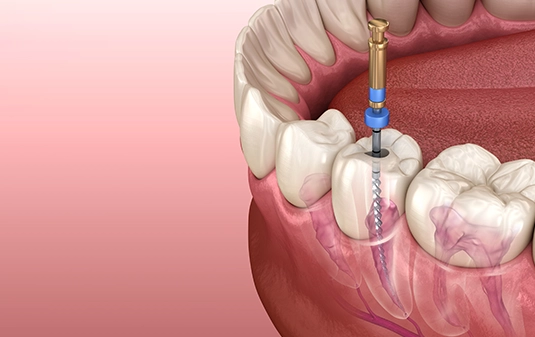Your oral health has a significant impact on your overall health and well-being. There are many issues that can arise that require specialized treatments including gum disease and severe tooth decay, which requires root canal treatment.
One of the most common questions that we are asked at Palisades Dental Care is: “Can you have root canal if you have gum disease?” Yes, it is possible to undergo root canal treatment if you have gum disease. This article explains what you need to know about gum disease and root canal treatments to help you answer this question.
What is Gum Disease?
The first step to answering this question is to explain gum disease.
Gum disease, also known as periodontal disease, is a prevalent condition that affects the tissues surrounding and supporting the teeth. It is primarily caused by the accumulation of plaque—a sticky film of bacteria—on the teeth. When plaque is not adequately removed through regular brushing and flossing, it can harden into tartar, leading to inflammation of the gums. If left untreated, tooth loss may occur.
Stages of Gum Disease
There are three stages of gum disease:


Gingivitis
Gingivitis is the first stage of gum disease and is characterized by red, swollen gums that may bleed during brushing or flossing.
Periodontitis
If gingivitis is left untreated, it can progress to periodontitis, where the inflammation extends deeper into the supporting structures of the teeth. Periodontitis can lead to the formation of pockets between the teeth and gums, which facilitates the accumulation of bacteria and results in further damage to tissues.
Advanced Periodontitis
In the advanced stage, periodontitis can cause significant damage to the bone and tissues supporting the teeth, leading to tooth mobility and potential tooth loss.
Common Symptoms of Gum Disease
The most common symptoms of gum disease include:
- Red, swollen, or tender gums
- Receding gums
- Persistent bad breath
- Bleeding gums, especially during brushing or flossing
- Changes in the alignment of teeth
What is Root Canal Treatment?
Root canal treatment, also known as endodontic therapy, is a dental procedure designed to address issues within the pulp of the tooth. The pulp contains nerves, blood vessels, and connective tissue.
When the pulp becomes infected/damaged due to factors such as deep decay, trauma, or cracks in the tooth, a root canal may be necessary. Symptoms include:
- Severe toothache, especially when chewing or applying pressure
- Prolonged sensitivity to hot or cold temperatures
- Swollen, tender gums near the affected tooth
- Darkening or discoloration of the tooth

Root Canal Procedure
There are several steps involved in the root canal procedure:
Diagnosis
X-rays and clinical examination to identify the extent of pulp damage.
Anesthesia
Local anesthesia is administered to ensure the patient’s comfort during the procedure.
Pulp Removal
The dentist creates an access opening to remove the infected/damaged pulp.
Cleaning and Shaping
The root canals are cleaned, shaped, and disinfected to remove any remaining bacteria.
Filling
The cleaned root canals are filled with a biocompatible material, and the access opening is sealed.
Restoration
A crown or filling is placed on the treated tooth to restore its structure and function.
Factors to Consider if You Have Gum Disease and Need Root Canal Treatment
If you have gum disease and need root canal treatment, there are several factors to consider:
Severity of Gum Disease
The severity of gum disease is a critical factor in determining whether a root canal is feasible. Mild cases of gum disease may not necessarily impede the process, but in advanced stages with substantial tissue damage, addressing the gum disease may become a priority before considering a root canal.
Infection Control
In cases where gum disease and the need for a root canal are interconnected due to infection, controlling the spread of the infection becomes paramount. Dentists may prescribe antibiotics to manage the infection before proceeding with the root canal to enhance the chances of a successful outcome.
Tooth Stability
The stability of the affected tooth is a key consideration. If gum disease has compromised the structural integrity of the tooth, dentists will assess whether a root canal is the best course of action or if alternative treatments, such as extraction and replacement, should be considered for long-term effectiveness.
Comprehensive Evaluation
A comprehensive evaluation of the patient’s oral health is crucial. This includes a thorough examination, often involving X-rays, to assess the extent of gum disease, the condition of the affected tooth, and any existing infections. Only through such a comprehensive assessment can a dentist formulate an effective treatment plan tailored to the individual’s needs.
Palisades Dental Care Can Handle Your Oral Health Needs
The answer to the question “can you have root canal if you have gum disease?” is yes, it is possible, depending on the specific circumstances and the patient’s oral health. We will work with you to determine the most appropriate course of action.
Maintaining good oral hygiene, attending regular dental check-ups, and following the prescribed treatment plan are essential for successful outcomes. By staying informed and proactive, individuals can navigate the complexities of dental care, ensuring not only the resolution of immediate issues but also the long-term health and functionality of their teeth. If you are experiencing symptoms that may indicate the need for a root canal or if you have concerns about gum disease, it’s crucial to consult with a qualified dentist who can provide personalized guidance based on your unique oral health needs.


